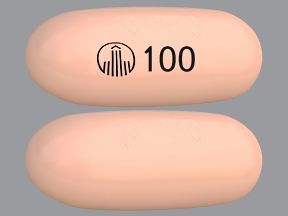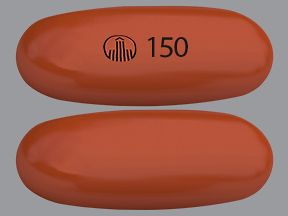If you have lung disease, your doctor might suggest Ofev as a treatment option. It’s a prescription drug used in adults:
- to treat pulmonary fibrosis from an unknown cause
- to treat long-term interstitial lung disease with scarring
- to slow worsening lung function from interstitial lung disease associated with systemic sclerosis
Ofev comes as a capsule you swallow and contains the active ingredient nintedanib. (An active ingredient is what makes a drug work.) It belongs to a group of drugs called tyrosine kinase inhibitors.
This article describes the dosages of Ofev, as well as its strengths and how to take it. To learn more about Ofev, see this in-depth article.
Note: This chart highlights the basics of Ofev’s dosage. Be sure to read on for more detail.
| Ofev form | Ofev strength | Usual dosage |
| capsule | • 100 milligrams (mg) • 150 mg | 150 mg twice per day |
Please keep in mind that this article covers Ofev’s standard dosing schedule, which is provided by the drug’s manufacturer. But always follow the dosage instructions your doctor prescribes.
The information below describes dosages that are commonly used or recommended. But be sure to take the dosage your doctor prescribes for you. They’ll determine the best dosage to fit your needs.
What is Ofev’s form?
Ofev comes as a capsule you swallow.
What strengths does Ofev come in?
Ofev comes in two strengths: 100 milligrams (mg) and 150 mg.
What are the usual dosages of Ofev?
The recommended dosage for adults is the same for all of the conditions it’s approved to treat. But Ofev’s prescribing information provides dosage assistance for adjustments in people with liver problems. Your doctor will prescribe the dosage that’s right for you.
The administration of your Ofev dose is done by you or your caregiver. It’s not usually given in your doctor’s office.
Dosage for long-term interstitial lung disease with scarring
To treat interstitial lung disease* with scarring, the usual dosage of Ofev is 150 mg two times per day. This is also the recommended maximum dosage (300 mg per day).
*This is a group of conditions that cause inflammation and scarring of the lung tissue.
Dosage for interstitial lung disease associated with systemic sclerosis
To slow worsening lung function from interstitial lung disease associated with systemic sclerosis,* the usual dosage of Ofev is 150 mg twice per day. This is also the recommended maximum dosage (300 mg per day).
*This is a condition where too much collagen (a kind of protein) is produced by your body.
Dosage for pulmonary fibrosis from an unknown cause
Idiopathic pulmonary fibrosis is a kind of interstitial lung disease from an unknown cause where scar tissue builds up in your lungs. To treat this condition, the usual dosage of Ofev is 150 mg two times per day. This is also the recommended maximum dosage (300 mg per day).
Is Ofev taken long term?
Yes, Ofev is usually prescribed as a long-term treatment. If you and your doctor determine that it’s safe and effective for your condition, you’ll likely take it long term.
Dosage adjustments
If you have mild liver problems, your doctor may prescribe a lower dosage of Ofev for you. Before you start treatment, you’ll take a blood test to see how well your liver is working. Depending on the severity of your liver problems, your doctor may prescribe a lower dosage of Ofev. Or they may recommend a different treatment option for you.
Your doctor will recommend the dosage of Ofev that’s right for you, as well as how often you’ll take it.
Ofev is usually taken twice per day. The timing of your doses should be about 12 hours apart. Ofev should be taken with food.
Ofev capsules should be swallowed whole. Do not crush, break, or chew the capsules. And avoid touching the contents of the capsules. Wash your hands right away if you come in contact with the contents inside Ofev capsules.
For information on the expiration, storage, and disposal of Ofev, see this article.
If you have trouble swallowing capsules, see this article for tips on how to take this form of medication.
Accessible drug containers and labels
If you find it hard to read the prescription label on your medication, tell your doctor or pharmacist. Some pharmacies provide medication labels that:
- have large print or use braille
- feature a code you can scan with a smartphone to change the text to audio
Your doctor or pharmacist may be able to recommend pharmacies that offer these accessibility features if your current pharmacy doesn’t.
If you have trouble opening medication bottles, let your pharmacist know. They may be able to supply Ofev in an easy-open container. They may also have tips to help make it simpler to open the drug’s container.
The dosage of Ofev you’re prescribed may depend on several factors. These include:
- if you have liver problems
- certain side effects you may experience from Ofev
- other conditions you may have (see “Dosage adjustments” just above)
- other medications you take
If you miss a dose of Ofev, skip the missed dose. Take your next dose at the usual scheduled time. You should not take two doses of Ofev at the same time or try to make up for a missed dose. Doing so can increase your risk of side effects.
If you need help remembering to take your dose of Ofev on time, try using a medication reminder. This can include setting an alarm or downloading a reminder app on your phone.
Do not take more Ofev than your doctor prescribes as this can lead to serious side effects.
What to do in case you take too much Ofev
Call your doctor right away if you think you’ve taken too much Ofev. You can also call 800-222-1222 to reach the American Association of Poison Control Centers or use its online resource. But if you have severe symptoms, call 911 (or your local emergency number) immediately or go to the nearest emergency room.
Below are answers to some common questions about Ofev’s dosage.
If Ofev isn’t working well enough for me, will my doctor increase my dosage?
If you’re taking the recommended dose of Ofev, it’s not likely to be increased. The recommended daily dosage of 150 milligrams (mg) taken twice daily is also the maximum daily dosage (300 mg per day).
In some cases, your doctor may prescribe 100 mg of Ofev twice per day. If that’s not working well enough, they may recommend increasing your dosage to 150 mg twice daily as long as you aren’t having side effects. This will depend on your particular situation.
In studies, Ofev was found to be effective for the conditions it was approved to treat. But if it’s not working well enough for you, talk with your doctor. They may recommend you come in for a checkup or suggest a different treatment option.
Smoking and taking certain other medications may decrease the effectiveness of Ofev. Examples include:
- phenytoin (Dilantin)
- carbamazepine (Carbatrol, Equetro, Tegretol)
- rifampin (Rifadin, Rimactane)
- the supplement St. John’s wort
To learn more about drugs that may interact with Ofev, see this in-depth article.
Will my doctor lower my dosage if I have side effects from Ofev?
Possibly. In most cases, mild side effects should be temporary. And some may be easily managed. But if your side effects are more severe, your doctor may recommend that your dose of Ofev be reduced to 100 mg twice per day. Or they may have you temporarily stop taking the drug. To learn more about Ofev’s side effects, see this in-depth article.
If your side effects go away or reduce to a level that you find manageable, your doctor may increase your dosage back to 150 mg twice per day. If your side effects continue at the lower dosage, your doctor will likely stop your Ofev treatment.
Liver damage is a serious side effect of Ofev. Your doctor will order blood tests to check your liver function before you start taking Ofev and during treatment. If you develop liver problems while taking this drug, your doctor will likely reduce your dosage or have you stop taking it.
Some symptoms of liver damage include:
- jaundice
- bleeding or bruising easily
- appetite loss
- upper right belly pain
- fatigue (low energy)
- dark colored urine
The sections above describe the usual dosages provided by the drug’s manufacturer. If your doctor recommends Ofev for you, they’ll prescribe the dosage that’s right for you.
Remember, you should not change your dosage of Ofev without your doctor’s recommendation. Only take Ofev exactly as prescribed. Talk with your doctor if you have questions or concerns about your current dosage.
Here are some examples of questions you may want to ask your doctor:
- How will my doctor change my Ofev dosage if my liver isn’t working well?
- Will my age affect my dosage of Ofev?
- If I take certain other medications, will my doctor change my dosage of Ofev?
Disclaimer: Healthline has made every effort to make certain that all information is factually correct, comprehensive, and up to date. However, this article should not be used as a substitute for the knowledge and expertise of a licensed healthcare professional. You should always consult your doctor or another healthcare professional before taking any medication. The drug information contained herein is subject to change and is not intended to cover all possible uses, directions, precautions, warnings, drug interactions, allergic reactions, or adverse effects. The absence of warnings or other information for a given drug does not indicate that the drug or drug combination is safe, effective, or appropriate for all patients or all specific uses.


